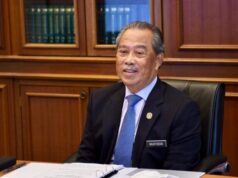OXFORD (United Kingdom), Sept 11- Malaysian Deputy Prime Minister Tan Sri Muhyiddin Yassin Tuesday said he believed that a peaceful Middle East is possible as the conflicts in the region are not an irreconcilable clash of cultures or religions but a man-made phenomenon that is rooted in questions of land, opportunity and justice.
 “It is a conflict that has spread terribly within the span of a single lifetime, and we would join our efforts to restrain the destructive elements and recognise and acknowledge that Muslims worldwide empathise with the sufferings of their brothers and sisters,” he said.
“It is a conflict that has spread terribly within the span of a single lifetime, and we would join our efforts to restrain the destructive elements and recognise and acknowledge that Muslims worldwide empathise with the sufferings of their brothers and sisters,” he said.
He said Muslims worldwide saw these sufferings as resulting from aggression and prosecution by the powers that be and the furtherance of foreign interests in these countries and region.
In his keynote address at the Oxford Centre for Islamic Studies (OCIS) Board of Trustees annual dinner at Ditchley Park County House here Tuesday night, the deputy prime minister said a return to the principle of ‘wasatiyyah’ or moderation was what he believed as the key in reaching any peaceful resolution.
He said it was this believe that led Malaysian Prime Minister Datuk Seri Najib Tun Razak to introduce the idea of the Global Movement of the Moderates (GMM) to the world during his maiden speech at the United Nations General Assembly in 2010, while urging the international community and leaders of the world’s major faiths to censure and reject their own extremists and jointly support the GMM.
Muhyiddin, who is in the United Kingdom on a five-day working visit beginning Sunday, said that he believed the right Islamic education was the key factor for the creation of a Muslim society that was at peace with itself and with others.
Malaysia’s Islamic education curriculum focused on ‘aqidah’, ‘mu’amalah’ and ‘akhlak’, the basic teachings of Islam, in order to mould the children’s mind and character in line with the good values of Islam as the religion of peace, he said.
“I believe that one of the main reasons why Muslims in Malaysia can live alongside people of other religions peacefully is because of the kind of Islamic education they receive in our schools, where the principles of moderation, religious tolerance and respect for others are strongly embedded in our formal religious curriculum,” he said.
He said children were taught that being pious Muslims also meant being good to others, and that respecting people of other religions, and even attending to their needs, did not make them less Muslim.
The deputy prime minister said Muslims in Malaysia were facing new challenges associated with globalisation and the spread of modern liberalism.
“The principle of ‘no compulsion in religion’ has been interpreted by some quarters to mean the right of Muslims to denounce Islam whereas in the original sense, it is understood as non-Muslims should not be coerced to embrace Islam,” he said.
“Similarly, rights related to sexual orientation such as Lesbian, Gay, Bisexual and Transgender (LGBT), which is not acceptable by the majority of Muslims, has been promoted by certain interest groups in Malaysia. As a Muslim country, Malaysia does not recognise LGBT rights,” he added.
Muhyiddin said he believed that it was important to enhance and revitalise the image and dignity of Islam and the ‘ummah’ worldwide, and one important way to do this was by improving the economic and social well-being of Muslims.
He said the problem of economic alienation, political subjugation and social disparities, which he felt were the root causes of political instability and economic backwardness across the Muslim world, needed to be addressed.
In this regard, he believed that the Organisation of Islamic Cooperation (OIC) should play a more important and crucial role towards the transformation of the ‘ummah’, particularly in the economic sphere.
“Malaysia, as a small Muslim nation, will continue to contribute in whatever way we can to promote peace and stability in the Muslim world and across the globe,” he said.
Earlier, Muhyiddin visited the OCIS new building in Marston Road where he was briefed on the progress of the building construction and various programmes of cooperation with the Malaysian partner.
OCIS is a recognised independent Centre of the University of Oxford, aimed at encouraging a better understanding of the culture and civilisation of Islam and contemporary Muslim societies through learning and scholarship.
-BERNAMA










